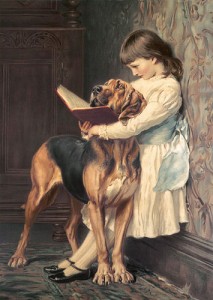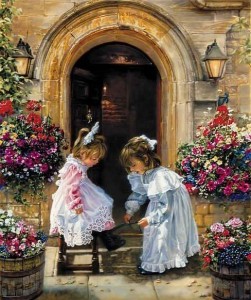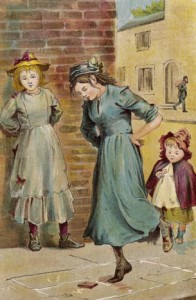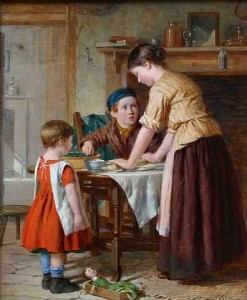 Charlotte Mason was a Christian educator from Victorian Era England. When I first read about her in homeschooling magazines and books, I immediately decided that I wanted to adopt many of her ideas. So much of what she recommends seems to be simply good old fashioned common sense that has been forgotten and would be shunned in many educational circles today. I majored in Child Development while I attended college, and what I acquired was a far cry from Charlotte Mason philosophy.
Charlotte Mason was a Christian educator from Victorian Era England. When I first read about her in homeschooling magazines and books, I immediately decided that I wanted to adopt many of her ideas. So much of what she recommends seems to be simply good old fashioned common sense that has been forgotten and would be shunned in many educational circles today. I majored in Child Development while I attended college, and what I acquired was a far cry from Charlotte Mason philosophy.
For Charlotte Mason, education was more to do with setting an atmosphere and a healthy lifestyle for your child than about workbooks and fact memorization. Yet, her approach was not ” child centered” in the modern sense that eliminates instruction, discipline and good habits. She spoke of providing a wholesome and stimulating home environment that encouraged learning while still allowing time for the carefree happy days of childhood. Charlotte Mason would probably love the saying that “homeschooling is a lifestyle.” I thought the following list of Charlotte Mason ” do’s & dont’s” might be helpful to those who are just getting to know Charlotte Mason philosophy. As I read the list, I think so much of what she taught is probably the way many of our forefathers were taught. Her ideas may seem old-fashioned but I wouln’t be surprised if I found out that many of our grandmothers would have done the same.
~Charlotte did not recommend using textbooks but encouraged the use of whole books. She called them “Living books”
~Charlotte believed that asking children to narrate back what they have learned or read is the best way to acquire knowledge and strengthen comprehension.
~No homework is recommended by Miss Mason, instead she believes the evenings should be filled with cozy evenings reading and spending time with family.
~Charlotte recommended short lessons and plenty of afternoon leisure. By leisure she would mean, healthy physical activity out doors, chores, nature journaling, cooking and other worthy tasks. Again, this sounds like a learning lifestyle to me. Do we actually only homeschool 180 days a year?
~Make plenty of time for the arts and humanities: music, art, poetry, music appreciation etc.
~proper education imparts and teaches good habits. Charlotte reminds us that a parent who takes the time to pass on good habits to their children secures smooth and easy days. She suggests working on one habit at a time.
~For handwriting Miss Mason recommends good old fashioned copy-work practice. We have been doing this for years and my boys have lovely penmanship. Our Grandma has volunteered for this subject and she gives lots of praise and encouragement as she simply sits and does her own copywork along side her grandchildren. I like to purchase nice journals especially for copywork lessons.
~Geography-Charlotte advocated learning about people in their surroundings, not just dry facts about locations, exports, and weather descriptions. Charlotte planned for a ten-minute map drill session once per week.
~Nature Studies & Nature Journals– Charlotte took her students on the original “field trips” by spending one afternoon per week outside in the fields, beaches or woods. Children are told to observe nature and enter their observations in their individual nature notebooks. Their entries can include pencil sketches, descriptions, watercolor paintings, or chalk drawings. Instruct children to draw what they see, not what they think something should look like. Be sure they label each entry with its name, location, and date observed. Field guides can help in identifying the plants and animal found in nature. Nature study lays the foundation on which future science lessons will build.
Postpone formal Grammar Lessons-Charlotte recommended postponing the formal study of grammar until the child reached the age of ten. Consistent practice in narration, dictation, and copywork lays the foundation for grammar study.
Bible Study-Children should read or have the Bible read to them each day. They should work on memorizing large portions of scripture.
Recitation- Occasionally assign a poem or a passage from a classic book to be memorized and recited. Charlotte believed that “all children have it in them to recite; it is an imprisoned gift waiting to be delivered” (Home Education, p. 223).
Handicrafts & Life-skills
- Beading
- Auto mechanics
- Baking
- Canning
- Changing a car tire
- Changing a lightbulb
- Checking the car’s oil
- Cleaning: mirrors, sinks, toilets, tubs and showers, baseboards
- Clearing the table
- Cooking
- CPR
- Driving a car
- Drying: clothes, dishes
- Dusting
- Electrical wiring
- Emptying trash
- First Aid
- Folding: clothes, towels, sheets

- Mopping
- Mowing the lawn
- Organizing: closets, cupboards, sheds, attics
- Painting a room
- Plumbing
- Raking leaves
- Setting the table
- Sweeping the floor
- Vacuuming
- Vegetable gardening
- Wallpapering
- Washing: clothes, dishes, windows, car
- Welding
- Computer skills
- Keyboarding/Typing
- Tracking personal finances
- Calligraphy
- Carving
- Ceramics
- Chalk drawing
- Charcoal sketching
- Clay sculpturing
- Crocheting
- Cross-stitching

- Embroidery
- Finger painting
- Flower arranging
- Gardening
- Iron sculpturing
- Kiting
- Knitting
- Latch-hooking
- Leather tooling
- Loom weaving
- Macrame
- Oil painting
- Pencil sketching
- Photography
- Picture framing
- Pottery
- Quilting
- Robotics
- Rubber stamping
- Scrapbooking
- Scroll sawing
- Sewing
- Spinning Fibers
- Spool Knitting
- Videography
- Water Color Painting
- Weaving
- Whittling
- Woodworking
